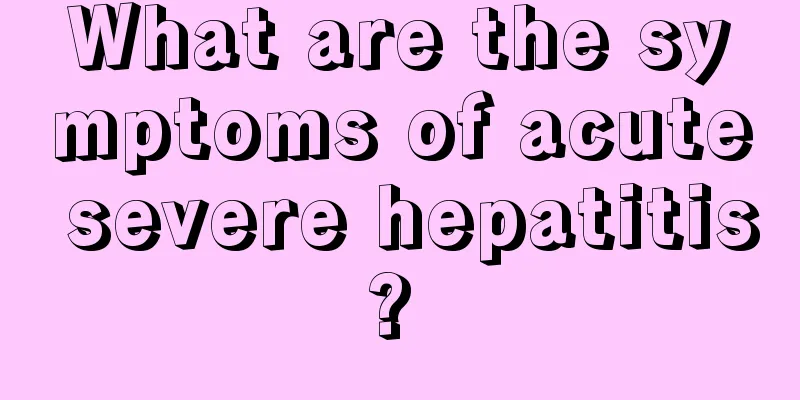What are the symptoms of acute severe hepatitis?

|
Many people have acute severe hepatitis. This disease usually develops rapidly and recovery is not fast, so everyone should be vigilant. Generally, many people with acute severe hepatitis may first enter the early stage of jaundice, and then enter the jaundice stage, and then go through a recovery period, which will completely lead to an attack of hepatitis, so everyone must be vigilant. (1) Pre-jaundice: The disease usually starts slowly, with mild fever or no fever, and joint pain and rash are common. Common symptoms include fatigue, loss of appetite, aversion to greasy foods, nausea, vomiting, and sometimes abdominal pain and diarrhea. This phase lasts an average of 5-7 days. (2) Jaundice stage: The fever subsides, the subjective symptoms are slightly alleviated, and jaundice appears on the sclera and skin, reaching a peak within a few days to 3 weeks. Dark yellow urine may cause transient lighter stools. Pain in the liver area, enlarged liver, soft texture, tenderness and percussion pain. This phase lasts 2-6 days. (3) Recovery period: The patient's jaundice gradually decreases and disappears, the stool color returns to normal, the skin itching disappears, the appetite improves, the physical strength recovers, the gastrointestinal symptoms are alleviated, the jaundice disappears, and the liver function returns to normal. This period is generally 1-2 months. 2. Acute anicteric hepatitis This type is more common and has milder symptoms, including general fatigue, loss of appetite, nausea, and abdominal distension. Physical signs include enlarged liver, soft texture, tenderness and percussion pain. This type of hepatitis has mild symptoms and is often overlooked. The course of the disease is about 2-3 months. Sometimes the severity of symptoms or signs varies depending on the severity of the disease. Acute severe hepatitis, also known as fulminant hepatitis. The clinical features are acute onset, with impaired consciousness, bleeding, jaundice and liver shrinkage within 10 days. The duration of illness does not exceed 3 weeks. The early clinical manifestations of fulminant hepatitis are similar to those of acute icteric hepatitis, but the disease progresses rapidly. Therefore, if the following symptoms appear, a severe diagnosis should be considered. Obvious symptoms of systemic poisoning. As the jaundice progresses, the patient will become extremely weak, listless, drowsy or insomniac, have personality changes, mental abnormalities, impaired calculation and orientation, asterixis, and impaired consciousness. |
<<: What should I do if my armpits often sweat?
>>: What should I do if hemorrhoids occur?
Recommend
Introduction to the early symptoms of brain cancer that everyone needs to pay attention to
Clinically, the success rate of early brain cance...
Will it hurt when wisdom teeth grow?
Teeth are very important to people. Wisdom teeth ...
What should I do if my ears are itchy and painful?
Why do ears itch and hurt? The most common causes...
How to clean sheep eggs
Sheep eggs actually have very high nutritional va...
The calf is sore and swollen in the middle of the night
When it is late at night and everyone is asleep, ...
Is it better to keep warm with a down jacket or a cotton jacket?
Down jackets and cotton jackets are two of the mo...
Benefits of Banana and Carrot Juice
Everyone knows that bananas and carrots are rich ...
What should I do if my glycosylated hemoglobin is high? How to regulate high glycosylated hemoglobin?
The detection of glycosylated hemoglobin is one o...
What should patients with endometrial cancer avoid in their daily life? Should they stick to a low-fat diet?
There are many ways to treat endometrial cancer, ...
What is the reason why you can't sunbathe if you have skin allergies
Sunbathing is a very pleasant thing, especially o...
Introduction to acne removal methods
There are many ways to remove acne. Many people t...
How long can you live with pain in the late stage of liver cancer? Nursing methods for pain in the late stage of liver cancer
I believe everyone has a certain understanding of...
Why open the eyes?
Canthoplasty is a relatively popular micro-plasti...
What should I do if I still miss her after breaking up?
Nowadays, it is very common for young people to f...
What are the early symptoms of lung disease
People will suffer from some diseases in their li...









